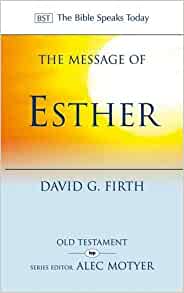Two of the Old Testament’s smaller books are named after women. Everybody loves Ruth, but Esther is often less appreciated. Yet the book of Esther has an important message for today.
David Firth has given us a fine exposition. He shows the book’s relevance for present-day Christians without in any way ignoring the claims of accurate exegesis. His commentary is full of special insights and the reader is often inclined to ask, ‘Why did I not see that myself?’ This makes it an object lesson in paying careful attention to the biblical text in both its original and present-day contexts.
Some have dubbed Esther edifying fiction, but David Firth argues persuasively for its historicity. Its literary qualities are evidence of good dramatic historical writing. Although God’s name is never mentioned nor is explicitly religious language used, believers clearly and rightly discern the Lord’s activity.
The author points out Esther’s use of ‘the divine passive’ which implies God’s activity without stating it; and he shows too the varied subtleties, ironies and even humour.
Esther may seem to stand apart from the rest of the Bible, but David Firth indicates its many links with the Old Testament; for example, the fact that Haman is an Agagite recalls the story of Saul and Agag in 1 Samuel 15. We should read Esther in the light of the whole biblical canon.
Esther is highly relevant for us as we live in a world in which God is largely forgotten, but where believers become aware of his activity in so many ways and are called to be faithful. We need the encouragement and challenge of Esther’s message.



